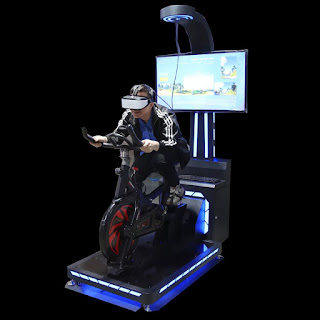The Rise of VR Simulator Machines: Immersive Gaming and Beyond
Virtual reality (VR) technology has been rapidly advancing in recent years, enabling users to experience immersive and realistic digital environments. VR is increasingly being used not only for gaming and entertainment, but also for various educational, training, and therapeutic purposes. To fully immerse oneself in a VR experience, however, one needs more than just a headset and a pair of controllers. That's where VR simulator machines come in.
A VR simulator machine is a specialized device that combines VR technology with physical motion and other sensory feedback to provide users with a more realistic and immersive experience. VR simulators can vary in size and complexity, from small devices that simulate simple movements to large machines that can replicate the sensation of flying or driving a car.
One of the most common types of VR simulator machines is the motion platform. Motion platforms are essentially hydraulic or electric systems that can tilt, rotate, and move in response to the user's movements in the virtual environment. This provides users with a more realistic sense of motion and can enhance the immersion of VR games and simulations. Motion platforms can be found in various setups, from small single-seat devices to large-scale installations in amusement parks and entertainment venues.
Another type of VR simulator machine is the haptic suit. Haptic suits are wearable devices that provide users with tactile feedback, such as vibrations or pressure, to simulate the sensation of touch in virtual environments. Haptic suits can enhance the immersion of VR experiences by making them more interactive and realistic. For example, a haptic suit could simulate the feeling of being hit or shot at in a VR shooter game.
VR simulators are not just limited to gaming and entertainment. They are also being used in various industries for training and simulation purposes. For example, the aviation industry uses VR simulators to train pilots in a safe and controlled environment, allowing them to practice various scenarios and emergencies without risking any real-life consequences. The military also uses VR simulators to train soldiers in combat scenarios and to develop their tactical skills.
In addition to training and simulation, VR simulators are also being used for therapeutic purposes. For example, VR therapy has been shown to be effective in treating various mental health conditions, such as anxiety disorders and PTSD. VR therapy sessions can be customized to the specific needs of the patient and can provide a safe and controlled environment for exposure therapy and other treatments.
The rise of VR simulator machines has also led to the development of new business opportunities. VR arcades and entertainment centers have become increasingly popular, providing customers with a unique and immersive gaming experience. VR simulators are also being used in theme parks and other entertainment venues, such as VR roller coasters and immersive movie experiences.
Overall, the development of Vcan VR simulator machines has opened up a whole new world of possibilities for gaming, education, training, and therapy. As the technology continues to advance, we can expect to see even more innovative and immersive VR experiences in the future. Whether you're a gamer, a pilot, a soldier, or someone looking for a unique and exciting experience, VR simulators offer a way to explore new worlds and realities in a way that was previously impossible.

评论
发表评论